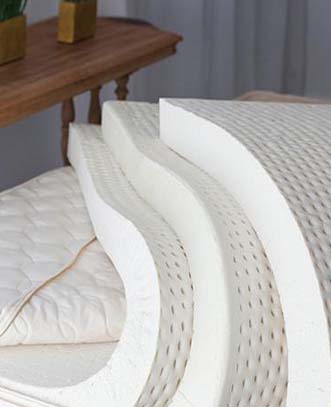Sleepworks Blog
Both memory foam and organic mattresses have advantages and disadvantages that are exclusive to them. Here are some advantages and disadvantages to compare the two:
Natural or Organic Mattresses
Pros:
Natural components:
Natural and frequently sustainably obtained components, such as organic cotton, wool, and latex, are used to make organic mattresses. These materials might be less harmful to the environment and smell less chemically than memory foam mattresses.
Breathability:
Compared to memory foam mattresses, organic mattresses are often more breathable, which can assist control body temperature and prevent overheating.
Hypoallergenic: For those with sensitive skin or respiratory conditions, organic ingredients may be less prone to cause allergies.
Cons:
Can be expensive: Compared to memory foam mattresses, organic mattresses can be more expensive. Some Organic mattresses can be a bit less depending on how firm or plush it is or who is sleeping on them. Some memory foam mattresses have been known to cost higher than others.
Less contouring: For persons with joint problems or chronic discomfort, organic mattresses could not offer the same level of pressure reduction and contouring as memory foam mattresses.
Mattresses made of organic materials usually survive longer than mattresses made of memory foam since natural materials don’t degrade more with time.

Memory Foam Mattresses
Pros:
Pressure relief: Memory foam mattresses can provide tailored pressure relief for places like the hips and shoulders since they adjust to the body.
Durability: Memory foam mattresses are often more durable than organic mattresses and, with regular maintenance, can last up to 10 years or longer.
Effective motion isolation: Couples who are easily bothered by each other’s movements may find comfort in memory foam mattresses’ ability to absorb motion. But don’t underestimate latex mattresses’ ability to isolate motion.
Cons:
Initial chemical odor: Some people may find the initial chemical odor that memory foam mattresses generate irritating.
Heat retention: Memory foam mattresses have a tendency to trap heat and may not be as airy as organic or latex ones, which some people may find uncomfortable.

Memory foam mattresses are frequently composed of synthetic materials, which may not be as environmentally friendly as mattresses made of natural materials. Try to find a memory foam that uses “Plant-Based or Vegetable Based oils” instead of petroleum.
The choice between an organic mattress and a memory foam mattress will ultimately come down to personal tastes and requirements. When choosing, it’s crucial to keep things like your budget, level of comfort, and environmental concerns in mind. By choosing an organic mattress, you can reduce your exposure to harmful petrochemicals and fire retardants.






